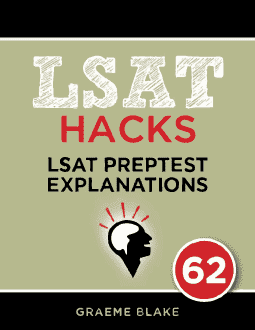QUESTION TEXT: Most large nurseries sell raspberry plants primarily…
QUESTION TYPE: Most Strongly Supported
FACTS:
- Large nurseries (most) ➞ sell mainly to commercial growers AND sell with disease free guarantee
- Johnson received diseased raspberries.
ANALYSIS: This question is testing how precisely you read. It’s also testing how well you understand “most” statements.
There’s not much you can do with “most statements”. You can only read them left to right. You can’t take a contrapositive of a “most” statement, and you can’t join them with anything except a conditional statement. * (see note)
So if Wally’s is a large nursery, then we know something. Otherwise, we don’t know anything.
It doesn’t matter if Johnson is commercial. It doesn’t matter if the plants were guaranteed. Those are “necessary” conditions of the most statement. Knowing those doesn’t tell us anything, because you can’t read “most” statement backwards or take contrapositives.
This understanding of “most” statements eliminates answers A-D. Only E tells us that Wally’s is a large nursery.
Note that we don’t know whether Wally’s guarantees its plants. We just know the plants were diseased. So if they were guaranteed, then they weren’t as they were guaranteed to be.
*(Note: There’s one exception. If we know “most americans are women” and “most americans wear hats” then we can conclude “at least some women wear hats”. That’s because the two majorities of americans must overlap. This doesn’t occur in the question. I’m only mentioning it for the sake of completeness.)
___________
- It doesn’t matter whether Johnson is a commercial grower. That’s on the right hand side of the “most” statement. Right hand side conditions don’t tell you anything.
- This is a weird answer. It’s trying to link the two conditions of the “most” statement. It negates the guarantee condition then tries to negate the commercial grower condition.
You can’t do this with most statements! There are no links between the right hand conditions, and negating the right hand condition has no effect. There’s very little you can do with “most” statements. - You can’t take a contrapositive of a “most” statement. That’s what this answer does. It reverses the “most” statement and negates it.
- We can’t ever conclude that Wally’s is probably not a large nursery. You can’t ever negate the left hand condition of a “most” statement.
This answer is trying to do that, because it negates one of the right hand conditions (the guarantee). But you can’t do this.
The commercial grower thing is also wrong; being a commercial grower is not a sufficient condition for anything. - CORRECT. If Wally’s is large, then they probably guarantee their plants. Probably = most large nurseries.
The plants were diseased. So if there was a guarantee, then the plants weren’t as guaranteed.
Recap: The question begins with “Most large nurseries sell raspberry plants primarily”. It is a Most Strongly Supported question. To practice more Most Strongly Supported questions, have a look at the LSAT Questions by Type page.


Answer choice (E) is is complete bullshit. The word “probably” contained in the answer choice negates the stimulus and thus the possibility of being a correct answer choice. I understand the contrapositive material described in your analysis, but nothing addresses the “probably” word that negates (E). I am not convinced that anybody of sound mind could justify this, but I am willing to listen and give you a chance. Thank you.
It may be helpful to know that “most” is equivalent to “probably”. When the stimulus says Most (51% or more) large nurseries guarantee disease free raspberry plants that also means that if you were to pick large nurseries at random, you would “probably” select one that guarantees. Very tricky, but important distinction being made here! Q21 is one of the hardest questions in this section so it takes the concept of “Most” which is easy and complicates it by using probably in the answer!
-Reply from LSAT Tutor, Morgan Barrett